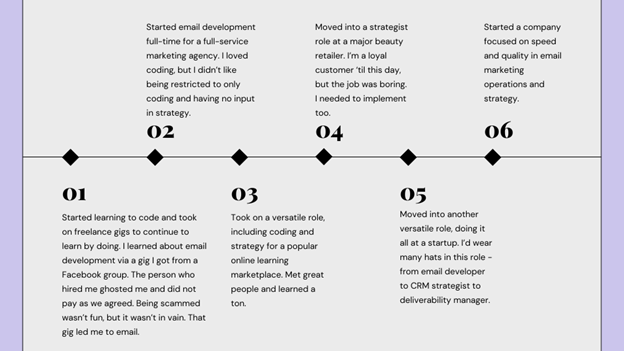More than Hitting Send: Your Email Career
Email has always been more than just "hitting send." With the constant evolution of digital communication, career opportunities in the world of email have expanded exponentially. If you're considering stepping into this realm or are just curious about what it entails, here's a comprehensive look at the roles, settings, and keys to success in the email industry.
Types of Roles
Sending an email is just the tip of the iceberg. Beneath the surface, there's an intricate world of code, design, marketing fundamentals, strategy, and copy, all working to convey a message effectively.
Choose Your Specialty
There are many moving parts in email; you could work with one, several, or all of them. Here are some roles that the industry offers:
1. Developer: They ensure the email functions correctly across platforms and devices, writing the code that underpins each email's structure. Basic email code includes HTML and CSS. There are email frameworks such as MJML. There is also AMP for email. When getting started in email development, HTML and CSS will suffice.
2. Marketer: Responsible for understanding the audience and ensuring the email reaches its target effectively. Email marketers take on different roles depending on the company. Some marketers focus strictly on strategy, while others focus on strategy and implementation. The scope of this role varies by company.
3. Copywriter: These are the storytellers. They craft the message, ensuring it's clear, compelling, and drives action. Email copywriting is unique because it tends to be more relational than other marketing channels. Email copy is often written with the goal of persuading the reader to click through the email to a landing page. Behavioral economics and psychology are helpful here.
4. Designer: They make the email visually appealing, ensuring it aligns with brand guidelines and catches the reader's eye. The designer should also be familiar with behavioral psychology concepts. The email should visually guide a user to take action.
5. Strategist: Planners at heart, strategists look at the bigger picture, determining what types of emails to send, when, and to whom. In title, strategists and marketers are often one and the same, but not always, especially in a larger organization. You may see roles titled email strategist or email marketing manager. Depending on the organization, these could be the same or different roles.
6. Operations: This role ensures that suitable systems are in place for emails to be sent, received, and tracked effectively. Often, email developers are included in operations. In different companies, you may see marketing operations teams with marketing operations managers. You may see email engineers. You may see Marketing Technology Managers or Strategists. These operational roles tend to include deploying emails, designing workflows, owning the marketing automation tool or email service provider, deliverability, and so much more.
7. Analytics: If numbers and results pique your interest, marketing analytics could be the place for you. An analyst would likely work with multiple marketing channels, not just email. So, if you dig email but want to play the field, marketing analytics might be the way to go. You may be involved in creating dashboards displaying things like email click rate, SMS conversion rate, and A/B test results, just to name a few.
Different Settings
No matter your specialty, there's a place for you. These roles can be performed in a plethora of settings:
1. Startups: Here, you might will wear multiple hats. Startups value versatility, a hands-on approach, and often speed. These small, young companies often require a versatile email professional who can code, develop strategy, maintain deliverability, and take ownership of marketing tools.
2. E-commerce: Driving sales and customer engagement are paramount. Think cart abandonment reminders and promotional emails. These emails may tend toward heavy imagery. Learning to balance product imagery and non-image-based elements will be important in e-commerce. E-commerce can be rewarding if you are someone who gets a rush from seeing immediate results.
3. Tech: Think newsletters, product updates, and user onboarding emails. For instance, if you worked for a Software-as-a-Service (SaaS) company, you may work on educating new product users through an onboarding or welcome sequence.
4. Retail: Flash sales, new collections, and loyalty programs. Similar to e-commerce and frequently both. The distinguishing factor is whether the company is exclusively an online retailer or is also a brick-and-mortar retailer. These communications will include product placement, sometimes models, and promotions. Expect to be busy around gifting holidays.
5. Freelance: Be your own boss. Choose the projects and clients you want. Choose what you want to do and when. This could include short-term or long-term contracts, one-off projects, or ongoing partnerships with companies that need your services.
6. Agency: Work with a variety of clients, helping them strategize and execute their email campaigns. Agencies often employ email developers, email designers, and email copywriters. Depending on the agency, you might work strictly on email or across multiple marketing channels.
7. Brand side: Deeply understand one brand's voice and audience, creating tailored email campaigns for them. Brand side includes everything that is not agency work. If you prefer to keep up with one set of brand guidelines, brand-side marketing may be for you.
8. Non-profit: These organizations tend to have two distinct audiences: donors and clients. NPOs communicate and market to these target audiences, with a mission or cause in mind.
Keys to Success
To thrive in the email industry, consider these:
1. Continuous Learning: With the digital world evolving rapidly, staying updated with the latest trends and technologies is crucial. Subscribe to industry newsletters. Opt into company email lists. Read industry blogs. Always be learning.
2. Networking: Connect with other professionals. They might provide insights, job opportunities, or collaboration possibilities. You’ll learn from them, and they’ll learn from you.
3. Volunteering: Offer your skills to non-profits or small businesses. It's a chance to build your portfolio and make a difference. Volunteering to speak at industry events or to help organize them are also great opportunities for career growth.
4. Teaching: Share your knowledge through webinars, workshops, or courses. It positions you as an expert in the field. Start a blog or newsletter, or write a book if you prefer a written format.
5. Industry Events: Attend seminars and conferences. They're great for learning, networking, and discovering opportunities.
6. Communities: Join online forums or groups dedicated to email professionals. They're a goldmine for advice, feedback, and camaraderie.
Create Your Own Adventure
The beautiful thing about a career in email? It's flexible. Whether you prefer coding, strategizing, or writing, you can carve out your niche. You may be at a startup today, but you're freelancing from a beach in Bali tomorrow. Remember, it's your career. Take it into your own hands, experiment with different paths, and find the one that ignites your passion.
My career in email, as an example...

 Photo by Stephen Leonardi on Unsplash
Photo by Stephen Leonardi on Unsplash

 How to resolve AdBlock issue?
How to resolve AdBlock issue? 
 Kisha Anderson is a CRM and Email Marketing Automation consultant as well as a coach to early-career email developers and marketers. After a decade in service-oriented and creative careers, Kisha approaches CRM and Email marketing from a customer-centric perspective combined with a heavy focus on systems and processes.
Kisha Anderson is a CRM and Email Marketing Automation consultant as well as a coach to early-career email developers and marketers. After a decade in service-oriented and creative careers, Kisha approaches CRM and Email marketing from a customer-centric perspective combined with a heavy focus on systems and processes.